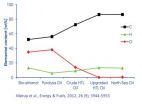(Press-News.org) A young woman in Tokyo pays 243,000 Yen for a Louis Vuitton suitcase emblazoned with the company's iconic monogram. A continent away, another woman purchases the same suitcase at the company's store on New York's 5th Avenue for the equivalent price in dollars, $3000. Why? What motivates their purchases? And, do those motivations hinge on their location?
That is precisely what Professor Jaehee Jung and her collaborators at universities in 9 other countries sought to answer. Their findings published recently in the journal, Psychology & Marketing, compared consumers' perceptions of luxury.
Despite the glum worldwide economy, luxury goods are selling well. Jung, an associate professor of fashion and apparel studies, and the others found that consumers in different countries, like the two women described above, purchase luxury goods for different reasons. For luxury goods makers, it is critical to consider these motivations, Jung said.
In the U.S. it's about hedonism.
"American consumers generally buy goods for self fulfillment, rather than to please others," she said.
Jung surveyed American college students. Many responded positively to statements such as "pleasure is all that matters." Factors including the quality of luxury items were not a driving concern for the students. Jung said this preference isn't surprising; it is cultural.
"In Western cultures where individualism is valued there is generally less pressure to fit in with groups, such as peers and co-workers, than in Eastern cultures where collectivism is valued," she said.
Hedonistic tendencies may be creeping into countries with developing economies. Brazilian and Indian students perceived luxury in the same way.
Surveys of students in France indicated they value luxury items because they are expensive and exclusive. French consumers responded positively to statements including: "true luxury products cannot be mass produced" and "few people own a true luxury product."
"Many luxury goods originate in France," Jung said. "Cultural heritage and pride might have made them feel luxury is not for everyone."
Meanwhile Germans focused on function, placing emphasis on quality standards over prestige, as did the Italians, Hungarians and Slovakians.
Jung and her collaborators intend to keep exploring what drives luxury purchases, saying it has consequence for marketers, as demand increases and their target consumer base widens. A growing number of customers, college students included, now have a taste for luxury goods, but are not necessarily financially stable. Still, they buy.
INFORMATION:
Study: Buying luxury -- hedonistic or just French?
2013-02-07
ELSE PRESS RELEASES FROM THIS DATE:
Smartphones, tablets help scientists improve storm forecasts
2013-02-07
The next advance in weather forecasting may not come from a new satellite or supercomputer, but from a device in your pocket. University of Washington atmospheric scientists are using pressure sensors included in the newest smartphones to develop better weather forecasting techniques.
"With this approach we could potentially have tens or hundreds of thousands of additional surface pressure observations, which could significantly improve short-term weather forecasts," said Cliff Mass, a UW professor of atmospheric sciences.
Owners of certain new Android smartphones and ...
Happiness increases with age, across generations
2013-02-07
Psychological well-being has been linked to many important life outcomes, including career success, relationship satisfaction, and even health. But it's not clear how feelings of well-being change as we age, as different studies have provided evidence for various trends over time.
A new report published in Psychological Science, a journal of the Association for Psychological Science, reveals that self-reported feelings of well-being tend to increase with age, but that a person's overall level of well-being depends on when he or she was born.
Psychological scientist ...
Tiny capsule effectively kills cancer cells
2013-02-07
A tiny capsule invented at a UCLA lab could go a long way toward improving cancer treatment.
Devising a method for more precise and less invasive treatment of cancer tumors, a team led by researchers from the UCLA Henry Samueli School of Engineering and Applied Science has developed a degradable nanoscale shell to carry proteins to cancer cells and stunt the growth of tumors without damaging healthy cells.
In a new study, published online Feb. 1 in the peer-reviewed journal Nano Today, a group led by Yi Tang, a professor of chemical and biomolecular engineering and ...
Personalized health care will revolutionize 21st century medicine, says NJIT professor
2013-02-07
A closer look at personalized or point-of-care healthcare was the focus of a recent international conference in India organized and chaired by NJIT Distinguished Professor Atam Dhawan. The IEEE Engineering in Medicine and Biology Society (EMBS) International Special Topic Conference in point-of-care healthcare technologies, broadcast around the world, focused on topics ranging from 21st century medicine with new smart cross-and trans-disciplinary technologies to how wireless communications will change how physicians care for patients.
"The last century witnessed a ...
Stanford researcher sheds new light on the mysteries of spider silk
2013-02-07
As fibers go, there's never been anything quite like spider silk. Stretch it. Bend it. Soak it. Dry it out. Spider silk holds up. It is five times stronger than steel and can expand nearly a third greater than its original length and snap right back like new. Ounce-for-ounce spider silk is even stronger than Kevlar, the man-made fiber used in bulletproof vests.
It would be understandable to think that science knows all there is to know about the remarkable physics of spider silk, but the truth is far from that. Now, using a long-known-but-underutilized spectroscopy technique, ...
Hydrothermal liquefaction -- the most promising path to a sustainable bio-oil production
2013-02-07
To emphasize, the HTL process accepts all biomasses from modern society – sewage sludge, manure, wood, compost and plant material along with waste from households, meat factories, dairy production and similar industries.
It is by far the most feedstock flexible of any liquid fuel producing process, including pyrolysis, bio-ethanol, gasification with Fischer-Tropsch or catalytic upgrading of different vegetable or agro-industrial residual oils, and does not carry higher costs than these.
Hydrothermal liquefaction is basically pressure cooking, but instead of cooking the ...
India joined with Asia 10 million years later than previously thought
2013-02-07
CAMBRIDGE, Mass. -- The peaks of the Himalayas are a modern remnant of massive tectonic forces that fused India with Asia tens of millions of years ago. Previous estimates have suggested this collision occurred about 50 million years ago, as India, moving northward at a rapid pace, crushed up against Eurasia. The crumple zone between the two plates gave rise to the Himalayas, which today bear geologic traces of both India and Asia. Geologists have sought to characterize the rocks of the Himalayas in order to retrace one of the planet's most dramatic tectonic collisions.
Now ...
Preserving biodiversity can be compatible with intensive agriculture
2013-02-07
UNIVERSITY PARK, Pa. -- Preserving genetically diverse local crops in areas where small-scale farms are rapidly modernizing is possible, according to a Penn State geographer, who is part of an international research project investigating the biodiversity of maize, or corn, in hotspots of Bolivia, Peru and Mexico.
Hotspots are areas where cultivation of peaches and other non-traditional crops has exploded over the past decade, noted Karl Zimmerer, professor and head of the Department of Geography, and where small-scale farms are often female-run and have been previously ...
Compound stimulates tumor-fighting protein in cancer therapy
2013-02-07
HERSHEY, Pa. --A compound that stimulates the production of a tumor-fighting protein may improve the usefulness of the protein in cancer therapy, according to a team of researchers.
TRAIL is a natural anti-tumor protein that suppresses tumor development during immune surveillance -- the immune system's process of patrolling the body for cancer cells. This process is lost during cancer progression, which leads to uncontrolled growth and spread of tumors.
The ability of TRAIL to initiate cell death selectively in cancer cells has led to ongoing clinical trials with artificially ...
People seek high-calorie foods in tough times says University of Miami study
2013-02-07
Bad news about the economy could cause you to pack on the pounds. This according to a new study from the University of Miami School of Business Administration published in the February edition of Psychological Science, a journal of the Association of Psychological Science. The study shows that when there is a perception of tough times, people tend to seek higher-calorie foods that will keep them satisfied longer. When subconsciously primed with such messages, a "live for today" impulse is triggered causing people to consume nearly 40 percent more food than when compared ...



